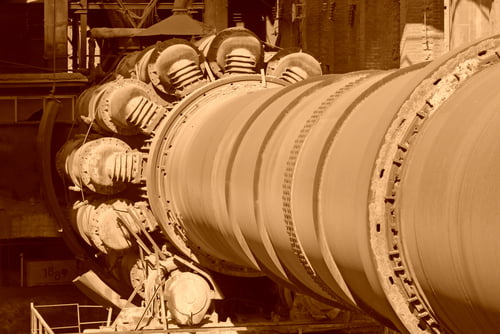6 Enclosure Cooling Considerations for Large Electrical Machines

A large machine includes any machinery that is physically large, complex, and operates as a stand-alone machine or integrated into a production line. Examples include cement kilns, paper making machines, heavy presses, and manufacturing machinery.
To ensure reliable operation, electrical control equipment must be protected so that the operating environment complies with manufacturers’ specifications for temperature and humidity. It’s also essential that equipment is kept clean and free of contamination. There are several cooling options can be used to meet both of these requirements.
Control Equipment Used On Large Machines
Depending on the machine and how it operates, various forms of control equipment are used to regulate different aspects of the machine.
Rotary motion is typically controlled by variable speed drives, while linear motion generally uses sophisticated, high-speed servo drives. Many machines use both types of drive, while servo-controlled hydraulic drives are also common. Although each drive has different characteristics, common elements include high peak power requirements, high-speed operation, and precise motion control. These drives generate a lot of heat that must be removed from the electrical control panel enclosure.
In addition to electronic drives, large machines invariably have PLC control, incorporate electronic protective devices, and feature numerous relays and contactors.
Electrical Enclosure Requirements
An overriding requirement for reliable operation is that electrical enclosures should be kept clean, cool, and dry:
- Cleanliness: Dust, dirt, and corrosive vapors contaminate electrical equipment causing corrosion, hot spots, and the possibility of electrical short-circuits especially on electronic drives and PLCs.
- Temperature: It’s considered good engineering practice to maintain the enclosure temperature below 95 ºF (35 ºC). This provides a reasonable safety factor and allows for some temperature variation within the enclosure.
- Humidity: Excess humidity may cause equipment to malfunction and fail. The relative humidity (RH) should always be below 95 percent (non-condensing), but some manufacturers specifically recommend a lower relative humidity.
- Location: If the machinery is installed in an outdoor location, this requirement may mean that the electrical enclosure must be outdoors as well, making it subject to excessive heat and pollution.
Six Cooling Options
Taking the above considerations into account, here are six electrical enclosure cooling options for large machines:
- Clean, dry, cool environment: In an air conditioned environment where the ambient temperature is maintained below 80 ºF, it’s generally possible to use filtered fans to keep the electrical enclosure temperature below 95 ºF.
- Dry, non-air conditioned: It may be possible to use fans, but it is more likely that an air to air heat exchanger or enclosure air conditioner would be required to ensure the enclosure temperature does not exceed the desired operating temperature.
- Hot, humid environment: The enclosure should be sealed (minimum NEMA 12), and cooling provided by an enclosure air conditioner. A heater could be required to ensure that moisture in the air does not condense in cool or cold weather. Consider using a stainless steel enclosure.
- Dust and dirt: In a dirty environment, the enclosure should be sealed to NEMA 4 levels to prevent ingress of dirt and fitted with a similarly rated enclosure air conditioner or air to air heat exchanger.
- Corrosive vapors: A stainless steel NEMA type 4X enclosure air conditioner or air to air heat exchanger is recommended to prevent oxidation of components by corrosive vapors. Also consider protecting the condenser and evaporator coils with epoxy coating.
- Outdoors: Electrical enclosures located outdoors are subject to rain, dust, and wind and generally require a weatherproof NEMA type 4, or 4X enclosure air conditioner or air to air heat exchanger with allowance made for the effects of solar radiation.
Importance of Proper Design
As the cooling requirements of large electrical machines vary considerably, a careful analysis of the thermal and other environmental requirements should be made before placing an order, Please call us at Thermal Edge so that we can recommend the best enclosure cooling solution for your large machines.

